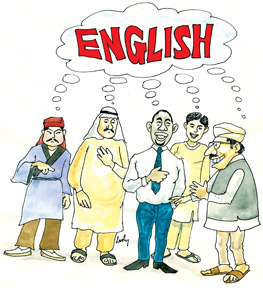Fight for cultural diversity amidst globalization
 Dominant global languages cast a shadow on cultural diversity. As
many as 2,500 languages struggle to be alive today according to UNESCO.
Millions in capital cities teeter having to choose a language with a
competitive edge like English over their mother tongue. The balance
between upward economic mobility and keeping their language alive is a
compelling narration. Dominant global languages cast a shadow on cultural diversity. As
many as 2,500 languages struggle to be alive today according to UNESCO.
Millions in capital cities teeter having to choose a language with a
competitive edge like English over their mother tongue. The balance
between upward economic mobility and keeping their language alive is a
compelling narration.
Leading linguists have suggested methods to safeguard a remarkable
trove of endangered tongues spoken in cities like New York, Florida and
Los Angeles. 'Exotic languages sustained by rich cultures' coming from
every corner of the globe and now more commonly heard than anywhere else
seemed to get the attention they deserve. Community groups work towards
their vitality by promoting regular cultural events and social
gatherings.
Compulsory schooling in a tongue or tongues dominating the globe
today had often pushed communities to abandon their native languages.
Their children did not inherit parents' language but learned a world
language in vogue.
Wars, ethnic cleansing and dominance by few world languages made the
situation worse.
UNESCO defined an endangered language "when its speakers cease to use
it, use it in an increasingly reduced number of communicative domains,
and cease to pass it on from one generation to the next. That is, there
are no new speakers, adults or children."
 The number of people speaking English and Spanish combined in New
York for example, is nearly five million compared to mere thousands each
for Tagalong (Philippines) Laotian, Urdu or Gujarati, Sinhalese, Tamil
or Malayali. English and Spanish by sheer numbers alone have gobbled up
many indigenous languages. The number of people speaking English and Spanish combined in New
York for example, is nearly five million compared to mere thousands each
for Tagalong (Philippines) Laotian, Urdu or Gujarati, Sinhalese, Tamil
or Malayali. English and Spanish by sheer numbers alone have gobbled up
many indigenous languages.
Preserving cohesiveness
In Florida and few other states where the immigrant population is
growing, the issue of language has entered the preservation debate,
mostly due to public perception that the banal influence of leaving the
ethnic fold was damaging individual identity and social cohesiveness.
Linguists have found that smaller communities were switching from the
mother tongue to English at an alarming rate. Even within the larger
linguistic enclaves like Thai, Vietnamese and Korean children were
getting into the English stream faster.
There are community-based cultural and religious events every year at
Christmas, Vesak, Diwali, Sinhala and Tamil New Year, Ramadan, Eid al-Fitr,
and Vaisakhi (Sikh) for example, held exclusively in the mother tongues
of the immigrant communities as a method of keeping their languages and
cultures vibrant.
No one to talk to
A story in Queens caught everyone's eyes that Husni Husain, who, as
far he knows, is the only person in New York who speaks Mamuju, the
Austronesian language he learned growing up in the Indonesian province
of West Sulawesi. It alerted all to what is happening to small
communities. Husain, 67, has nobody to talk to, not even his wife who is
from Java, and all the children were born in Jakarta "they don't
associate with the Mamuju," he said. "I only speak Mamuju when I go back
or when I talk to my brother on the telephone."
Many believe that it is the diversity that makes for the vibrancy of
cities like New York and Los Angeles. These make them the most
linguistically dynamic cities in the world.
They are home to a remarkable group of endangered tongues that have
taken root everywhere - languages born in every corner of the globe and
now more commonly heard in various corners of the big cities.
Some experts believe that New York may be home to as several hundred
languages - far more than the 176 spoken by students in the city's
public schools or the 138 that residents of Queens, New York's most
diverse borough, listed on their national census forms of 2000.
Endangerment hot spot
As reported in the media "New York is easily the capital of language
density in the world," according to Daniel Kaufman, an adjunct professor
of linguistics at the Graduate Center of the City University of New
York. He added 'We're sitting in an endangerment hot spot where we are
surrounded by languages that are not going to be around even in 20 or 30
years.'
Professor Kaufman has helped start a project, the Endangered Language
Alliance, to identify and record dying languages, many of which have no
written alphabet, and encourage native speakers to teach them to
compatriots.
He is joined by Professor Robert Holman of Columbia who believes that
'It's hard to use a word like preserve with a language. It's not like
putting jelly in a jar. A language is used. Language is consciousness.
Everybody wants to speak English, but those lullabies that allow you to
go to sleep at night and dream' that's what we're talking about.'
The Endangered Language Alliance it was reported will apply field
techniques usually employed in exotic and remote foreign locales as it
starts its research in the city's vibrant ethnic enclaves. "Nobody had
gone from area to area looking for endangered languages in New York City
spoken by immigrant populations," Professor Kaufman said. People are
doing that now.
The United Nations keeps an atlas of languages facing extinction, and
UN experts as well as linguists generally agree that diversity needs to
be protected. Many languages face the threat of declining population of
native speakers. Higher awareness levels needed to halt such a trend
seemed to be gathering some steam now.
|



